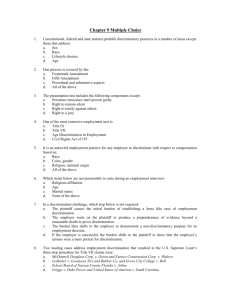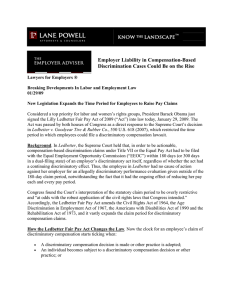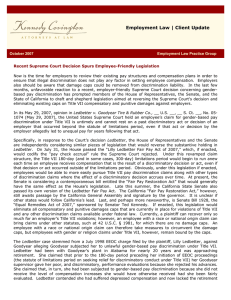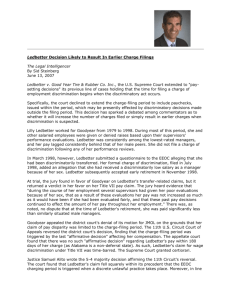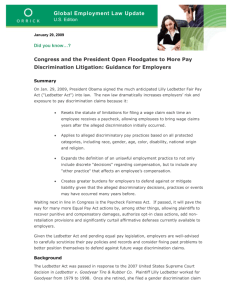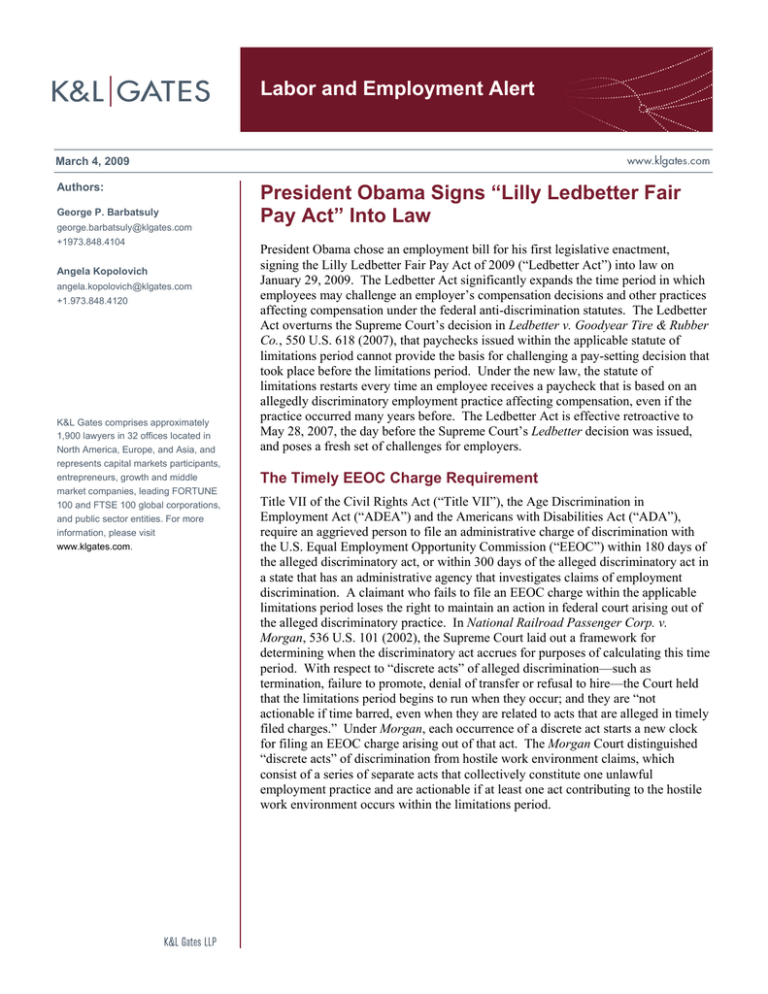
Labor and Employment Alert
March 4, 2009
Authors:
George P. Barbatsuly
george.barbatsuly@klgates.com
+1973.848.4104
Angela Kopolovich
angela.kopolovich@klgates.com
+1.973.848.4120
K&L Gates comprises approximately
1,900 lawyers in 32 offices located in
North America, Europe, and Asia, and
represents capital markets participants,
entrepreneurs, growth and middle
market companies, leading FORTUNE
100 and FTSE 100 global corporations,
and public sector entities. For more
information, please visit
www.klgates.com.
President Obama Signs “Lilly Ledbetter Fair
Pay Act” Into Law
President Obama chose an employment bill for his first legislative enactment,
signing the Lilly Ledbetter Fair Pay Act of 2009 (“Ledbetter Act”) into law on
January 29, 2009. The Ledbetter Act significantly expands the time period in which
employees may challenge an employer’s compensation decisions and other practices
affecting compensation under the federal anti-discrimination statutes. The Ledbetter
Act overturns the Supreme Court’s decision in Ledbetter v. Goodyear Tire & Rubber
Co., 550 U.S. 618 (2007), that paychecks issued within the applicable statute of
limitations period cannot provide the basis for challenging a pay-setting decision that
took place before the limitations period. Under the new law, the statute of
limitations restarts every time an employee receives a paycheck that is based on an
allegedly discriminatory employment practice affecting compensation, even if the
practice occurred many years before. The Ledbetter Act is effective retroactive to
May 28, 2007, the day before the Supreme Court’s Ledbetter decision was issued,
and poses a fresh set of challenges for employers.
The Timely EEOC Charge Requirement
Title VII of the Civil Rights Act (“Title VII”), the Age Discrimination in
Employment Act (“ADEA”) and the Americans with Disabilities Act (“ADA”),
require an aggrieved person to file an administrative charge of discrimination with
the U.S. Equal Employment Opportunity Commission (“EEOC”) within 180 days of
the alleged discriminatory act, or within 300 days of the alleged discriminatory act in
a state that has an administrative agency that investigates claims of employment
discrimination. A claimant who fails to file an EEOC charge within the applicable
limitations period loses the right to maintain an action in federal court arising out of
the alleged discriminatory practice. In National Railroad Passenger Corp. v.
Morgan, 536 U.S. 101 (2002), the Supreme Court laid out a framework for
determining when the discriminatory act accrues for purposes of calculating this time
period. With respect to “discrete acts” of alleged discrimination—such as
termination, failure to promote, denial of transfer or refusal to hire—the Court held
that the limitations period begins to run when they occur; and they are “not
actionable if time barred, even when they are related to acts that are alleged in timely
filed charges.” Under Morgan, each occurrence of a discrete act starts a new clock
for filing an EEOC charge arising out of that act. The Morgan Court distinguished
“discrete acts” of discrimination from hostile work environment claims, which
consist of a series of separate acts that collectively constitute one unlawful
employment practice and are actionable if at least one act contributing to the hostile
work environment occurs within the limitations period.
Labor and Employment Alert
The Ledbetter Decision
Several years after Morgan, the Supreme Court
granted certiorari in Ledbetter to resolve a circuit
split on the proper application of the limitations
period in Title VII disparate treatment pay cases.
Plaintiff Lilly Ledbetter was a 19-year employee of
Goodyear, who brought claims under Title VII and
the Equal Pay Act. She alleged that supervisors
throughout her career had given her poor evaluations
because of her sex, and that as a result, her pay was
not increased as much as it would have with fair
evaluations. She contended that long-past pay
decisions continued to affect her pay over the years,
and that toward the end of her employment she was
paid significantly less than her male counterparts.
The District Court awarded Ledbetter back-pay and
damages, but the Eleventh Circuit reversed, holding
that her Title VII claim was time barred. The court
reasoned that her claim could not be maintained
because no discriminatory acts took place in the 180
days prior to the filing of her charge. The Supreme
Court affirmed in a 5-4 decision. Relying on
Morgan and other prior Supreme Court cases, the
majority held that a discriminatory pay-setting
decision constitutes a “discrete act” of employment
discrimination. As a result, the Court held that the
period for filing an EEOC charge begins to run when
the pay-setting decision occurs. The Court rejected
plaintiff’s argument that each paycheck limitations
period gave present effect to past discrimination,
because present discriminatory intent was lacking.
The Court found that each paycheck was a
nondiscriminatory act that amounted only to present
adverse effects from past discriminatory acts, which
are not actionable under Title VII. In dissent, Justice
Ginsburg argued that pay disparities are more akin
to hostile work environment claims than to discrete
acts of discrimination under Morgan because they
rest on the cumulative effect of individual acts and
not a single paycheck. In her view, pay disparities
are unlike “easy to identify” discrete acts of
discrimination such as a denial of a promotion or
transfer, failure to hire, or termination, and should be
actionable with the issuance of each paycheck.
Justice Ginsburg invited Congress to act to overrule
the majority’s interpretation of Title VII.
Congressional Response: the
Ledbetter Act
The congressional response to Ledbetter was
extreme. Finding that the decision “significantly
impairs statutory protections against discrimination
in compensation” and “unduly restrict[s] the time
period in which victims of discrimination can
challenge and recover for discriminatory
compensatory decisions and other practices,”
Congress passed the Ledbetter Act, and this law
became the first piece of legislation signed into law
by President Obama. The new law amends Title
VII, the ADA, the ADEA, and the Rehabilitation
Act of 1973 to provide that an “unlawful
employment practice” occurs when a
“discriminatory compensation decision or other
practice” is adopted, when an individual becomes
subject to the decision or other practice, or when the
individual is “affected” by application of the
decision or practice, including each time
compensation is paid. Although the Ledbetter case
involved only gender-based discrimination under
Title VII, the new law applies to claims alleging
compensation discrimination based on all categories
protected by Title VII, the ADA, the ADEA, and the
Rehabilitation Act—i.e., claims of discrimination
based on race, color, religion, sex, national origin,
age, and disability. While it does not appear that the
Ledbetter Act directly impacts the Morgan decision,
it certainly repositions pay disparity claims from the
“discrete act” category so that they are now
analyzed in conformity with the hostile work
environment claims, as the Ledbetter dissent had
suggested. Each new paycheck now serves as an act
that constitutes part of the discrimination and resets
the clock on the EEOC filing period.
The new law expands this paycheck accrual rule
beyond pay-setting decisions and applies to any
“other practice” relating to discrimination in
compensation. The term “other practice” is
undefined and leaves open the possibility that
otherwise time-barred discrete employment
actions—such as denials of promotions, transfers,
hiring, and termination decisions—could be revived
if they are alleged to have affected an individual’s
compensation.
March 4, 2009
2
Labor and Employment Alert
The Ledbetter Act provides that an aggrieved
individual may recover back pay for up to two years
preceding the filing of an EEOC charge, “where the
unlawful employment practices that have occurred
during the charge filing period are similar or related
to unlawful employment practices that occurred
outside the time for filing a charge.”
Retroactive Effect
The Ledbetter Act takes an interesting approach to
retroactivity. It provides that it takes effect “as if
enacted on May 28, 2007 and [will] apply to all
claims of discrimination in compensation . . . that
are pending on or after that date.” This provision
appears intended to undo the Ledbetter decision,
which was issued on May 29, 2007, although it
leaves several significant questions unanswered. For
instance, does this statute resurrect claims dismissed
as a result of Ledbetter? What about suits that were
pending on May 28, 2007 but were based on conduct
that took place prior to that date? More importantly,
does making this statute effective May 28, 2007
create the legal fiction that Ledbetter never
happened, requiring cases that are still pending
based on conduct prior to the effective date to now
apply pre-Ledbetter case-law? Or should conduct
that occurred prior to May 28th still be governed by
the Court’s interpretation?
Several courts have already weighed on the
retroactivity issue, holding that the Ledbetter Act
applies to all claims that are pending on or after May
28, 2007, even if based on alleged discriminatory
conduct that occurred prior to May 28, 2007.1 The
1
See Rehman v. State Univ. of N.Y., No. 08-CV-0326, 2009
U.S. Dist. LEXIS 12897, *14-15 (E.D.N.Y. Feb. 6, 2009)
(holding that plaintiff’s wage discrimination claims based on
actions occurring on or after April 13, 2005, two years prior to
the filing of his EEOC charge on April 13, 2007, are timely);
Vuong v. New York Life Ins. Co., No. 03 Civ. 1075, 2009 U.S.
Dist. LEXIS 9320 (S.D.N.Y. Feb. 6, 2009) (holding that
Ledbetter Act allows plaintiff to proceed on compensation
discrimination claim based on alleged discriminatory pay
allocation decision that occurred in February 1998, where
EEOC charge was filed on August 2, 2002); Gilmore v. Macy’s
Retail Holdings, Civ. No. 06-3020, 2009 U.S. Dist. LEXIS 7894
(D.N.J. Feb. 4, 2009) (acting on Court’s own motion to
consider the impact of the Ledbetter Act, allows plaintiff to
pursue pay discrimination claim under Title VII based on
alleged discriminatory paychecks issued as early as July 7,
2003, two years before she filed her EEOC charge on July 7,
2005).
constitutionality of such an approach to retroactivity
can be expected to be the source of future litigation.
Compliance Challenges
The Ledbetter Act presents a number of compliance
challenges for employers. Under the new law, paysetting decisions and other decisions bearing on
compensation (e.g., promotions) may be called into
question in employment discrimination suits filed
years later. Thus, now, more than ever, it is
essential for employers to have effective
documentation of such decisions. Complete and
accurate personnel records are a must. Employers
should retain such records indefinitely and adjust
their record retention policies accordingly.
Employers should ensure that managers are trained
in the proper evaluation of personnel for
performance, pay, and promotion decisions, and the
proper documentation of such decisions. Finally,
employers should consider conducting a high-level
review of their workforce salary data to assess
whether there are currently any actual or perceived
pay disparities and, where appropriate, consider
taking proactive steps to remedy such disparities.
Paycheck Fairness Act Next?
The Ledbetter Court expressly noted that its
analysis had no impact on the Equal Pay Act
(“EPA”), which also prohibits pay disparities based
on sex. Under that law, a plaintiff can make a
prima facie case by showing that the employer pays
different wages to employees of opposite sexes for
equal work (with equal skill, effort, and
responsibility) under similar working conditions.
The employer then bears the burden of showing by
a preponderance of the evidence that the difference
is justified by a bona fide seniority or merit system,
by a system of earnings based on productivity, or
that the differential is based on a factor other than
sex. As the Ledbetter Court noted, the EPA does
not require proof of discriminatory intent or the
timely filing of a charge of discrimination with the
EEOC. Lilly Ledbetter had originally pursued an
EPA claim, which was dismissed on summary
judgment. The Supreme Court noted that had the
plaintiff further pursued her EPA claims, she would
not have faced the limitations period obstacles she
experienced under Title VII.
March 4, 2009
3
Labor and Employment Alert
Even though Ledbetter did not impact the EPA, the
version of the Ledbetter Act that originally passed in
the House of Representatives contained a companion
section which would have amended the EPA. That
section was introduced in the Senate in January 2009
as a separate bill entitled the Paycheck Fairness Act
of 2009 (S. 182) (“PFA”). The PFA would bar
employers from retaliating against any employee
who shares pay information with co-workers.
Moreover, the bill would drastically narrow the “any
factor other than sex” defense which is currently
available under the EPA. The PFA would require
employers to demonstrate a bona fide factor other
than sex which is consistent with business necessity.
Thus, an employer still could be liable for a pay
differential for reasons unrelated to sex if the
plaintiff could show that there was an alternative
practice that would serve the same business purpose
without producing the differential, and the employer
failed to adopt such an alternative practice. Third,
the pending bill would significantly increase
penalties for violations. Currently, the EPA
provides for only back pay damages and an equal
amount in liquidated damages. The PFA would
remove all caps on compensatory damages and
would authorize awards of punitive damages, even
for unintentional violations. Finally, the PFA would
enlarge the comparison pool by redefining
“establishment” as encompassing even those
employer facilities that are in separate physical
locations. If enacted, the PFA would represent
another significant departure from current law and
expose employers to even greater liability for pay
disparities.
K&L Gates comprises multiple affiliated partnerships: a limited liability partnership with the full name K&L Gates LLP qualified in Delaware and
maintaining offices throughout the U.S., in Berlin and Frankfurt, Germany, in Beijing (K&L Gates LLP Beijing Representative Office), in Singapore
(K&L Gates LLP Singapore Representative Office), and in Shanghai (K&L Gates LLP Shanghai Representative Office); a limited liability partnership
(also named K&L Gates LLP) incorporated in England and maintaining our London and Paris offices; a Taiwan general partnership (K&L Gates)
which practices from our Taipei office; and a Hong Kong general partnership (K&L Gates, Solicitors) which practices from our Hong Kong office.
K&L Gates maintains appropriate registrations in the jurisdictions in which its offices are located. A list of the partners in each entity is available for
inspection at any K&L Gates office.
This publication is for informational purposes and does not contain or convey legal advice. The information herein should not be used or relied upon
in regard to any particular facts or circumstances without first consulting a lawyer.
©2009 K&L Gates LLP. All Rights Reserved.
March 4, 2009
4


